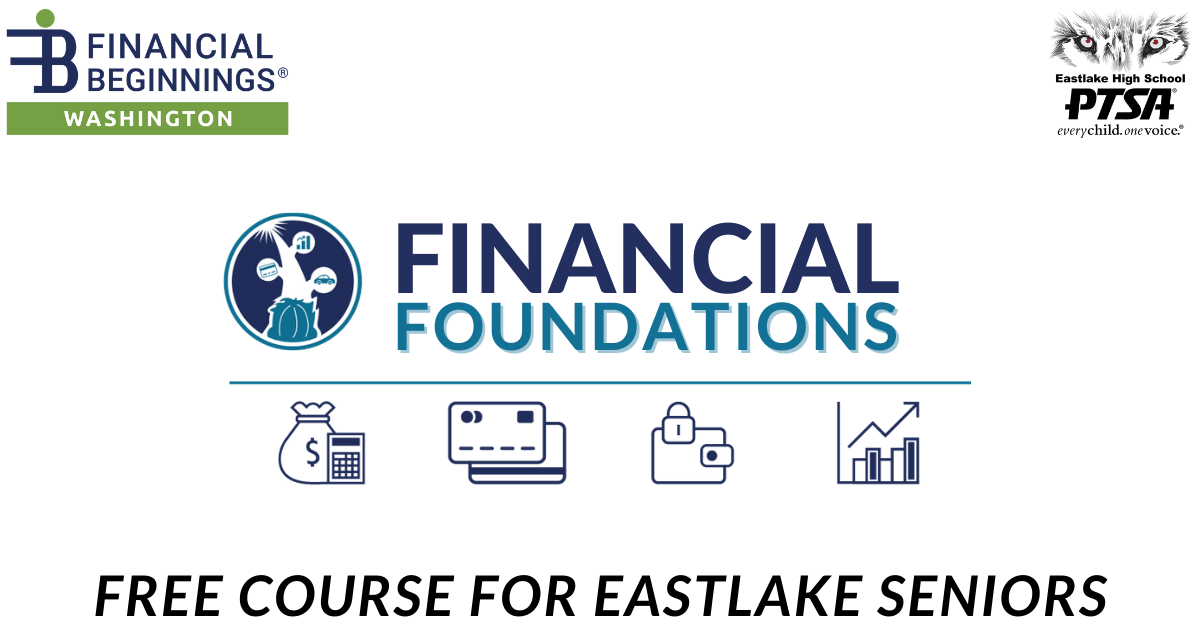

EHS PTSA is proud to partner with Financial Beginnings of Washington to offer Eastlake seniors an important and FREE series of live online classes presented by volunteer financial industry professionals, providing personal finance essentials and detailed introduction to key financial concepts. This offering includes 5, 60 minute sessions, each with a different topic.
All students are encouraged to check out Mrs. Peterson's Personal Finance elective class.
The classes will be held on Tuesdays at 4:00pm on November 10, 17, 24, December 1 and 8. While it is not required to attend all sessions to understand each subject, we highly recommend students do so. This course is FREE to attend, but registration is required.
The following subjects will be covered, one per week:
Banking is important to understand because participation in banking services is typically one's first exposure to the financial world. Most often we depend on banks and credit unions to safeguard our money so it is helpful to understand what they are doing with our money and how keeping our money in a bank or credit union can be beneficial. In this section we introduce financial institutions, how they work and how students can utilize them in managing their money. Students will learn the difference between banks and credit unions, understand how to choose the right bank or credit union for them, understand the benefits and services that financial institutions provide, learn how to avoid banking fees and how to calculate the different types of interest.
Budgeting is the foundation of personal financial planning. Budgeting allows us to manage our money by tracking our income and expenses. Since every person is different it is important to know how to create a budget that can be used for our own specific needs. Students will learn the components of a budget and how one can be created/ maintained, the different types of income and how taxes apply, how to budget for expenses and the difference between variable and fixed expenses, how short-term and long-term financial goals are set and utilized and tips to keeping your budget relevant.
In today's economic society it would be rare to not use credit to pay for things such as online or large purchases, car repairs or in emergency situations. Credit can be an overwhelming topic, but understanding credit is critical in responsible management of one's finances. Armed with a few key concepts, however, students can successfully manage their credit in a proactive way. Students will learn what credit is, how it works and why it's needed, the different ways of establishing credit, the responsibilities of a borrower, how to monitor credit using a credit report and credit score and understand loans and credit cards and how to borrow responsibly.
Investing is an excellent way to build wealth and achieve your financial and life goals. The Investing section of this guide and accompanying classroom session will help students to understand the key concepts of investing. Students will learn what investments are and how they can help achieve financial goals, understand risk vs. return and diversification, learn about common types of investments, common options for retirement savings, learn the kind of investor/saver they are and the pros and cons of each type.
Many times people feel that they are paying money into insurance policies, but not getting their fair share back. This is not how insurance should be viewed. Purchasing insurance is a way to manage risk. Students will learn what insurance is, why it is needed and how it works, what insurance premiums are and how they are determined, what liability coverage is and how it applies to auto and renters/home insurance policies, understand types of insurance and when they apply in real life, and learn insurance contracts and the major decisions that have to be made when purchasing policies.